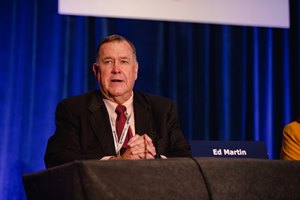Martin Cautions IL Racing Board Over HISA Costs


The horse racing industry faces uncertainty about the cost of implementing the operations of the new federal Horseracing Integrity and Safety Authority and who will be getting the bill, Ed Martin, president of the Association of Racing Commissioners International, told the Illinois Racing Board Dec. 16.
HISA was established by Congress to assume regulatory authority over horse racing in the United States—duties currently carried out by state racing commissions. Draft racetrack safety rules have been submitted to the board. Rules regarding medication are due before the end of the year. Cost considerations will be addressed during 2022, HISA representatives said Dec. 9 during a presentation to the Draft Rules Committee of the Association of Racing Commissioners International.
HISA Officials: Be Wary of Assumptions About Rules
A July 1, 2022 deadline imposed by Congress for the agency to be up and running will be met, but certain elements are to be phased in over time, according to HISA representatives. All safety rules will be in effect immediately, however, the U.S. Anti-Doping Agency's role in medication enforcement will start only with out-of-competition testing and investigative work. Post-race testing as it will exist under USADA has been pushed to 2023.
Martin warned the IRB that lawmakers in Illinois and in other racing states could see the implementation as a chance to quit funding administration of racing and, instead, pass the cost along to the industry itself.
HISA staff is charged with interfacing with state racing commissions to decide on a state-by-state basis what tasks will continue to be done by state personnel under federal rules and what will be turned over to a new enforcement agency, Martin said.
HISA has yet to contract with an enforcement agency and costs are totally unknown, he added. In states where tasks such as the collection of out-of-competition testing samples, enforcement, and adjudication of issues are given over to HISA, "covered entities" in that state's racing industry will be assessed the cost—whatever that's determined to be.
"The $64,000 question," he said, "is 'What will the cost be for all of this?' It's time to have that known, and it's time to begin the operational negotiations with the states as to how this will actually work."
Another question is how state legislators will react when they realize they can hand off some of the costs of administering racing from the state commission budgets to industry participants as a pass-through from HISA, Martin said.
"There are some states that are in severe fiscal distress who may say that the federal government passed a bill that says we don't have to do this anymore or pay for it," he told the board. "And this new authority has authority to raise their own fees and assess fees on people in Illinois and elsewhere to pay, either for the entire program or the extras within the state of Illinois.
"The danger of that is there are public funds already committed to racing regulatory activity and they no longer wish to appropriate these funds and the industry will lose the benefit of those funds coming to help police the sport," Martin said.
"That will play out very differently in every state and it will be largely impacted by decisions that will be made at levels above the Illinois Racing Board, I would assume."
Martin said neither the HISA board nor its staff has the requisite knowledge of the ins and outs of state government machinations to appreciate the difficulties that regulators face.
"For instance, and don't take this the wrong way," he said after a pause and referring to IRB executive director Domenic Dicera, "Domenic has a lot of operational headaches that he probably doesn't share with all the commissioners. He just has to try to work through them and to try to solve the issues before the policy matters come up to the commission.
"But there's a lot of interactions with state budget divisions and state agencies to approve positions or get adequate funding for a particular line. I know. I ran the New York Racing and Wagering Board for about nine years. We would get our budget from the state of New York and the Budget Division would call up about midway through the fiscal year and unilaterally cut the amount of money we were allowed to spend by about 20%. That's just the reality of running a state agency.
"We're trying to explain these operational headaches, which HISA needs to understand as they envision a partnership. They say they'd like a partnership with the states on these matters. And the states are certainly willing to do that but so far, they've not let the states in the room."
Spotlight on HISA as Global Symposium on Racing Opens
Martin said his organization has tried to work with HISA staff but concerns remain.
"In some cases, they have listened to some of the input the ARCI or some of its members have provided," he noted. "But these are their decisions. And our concern is that if they choose not to maximize the existing public infrastructure, then that's going to be an extremely costly imposition on an already financially struggling industry."
